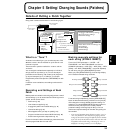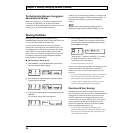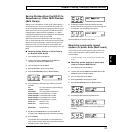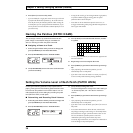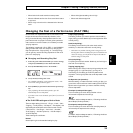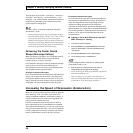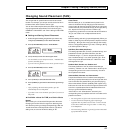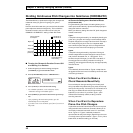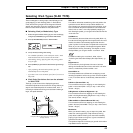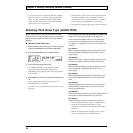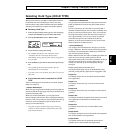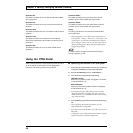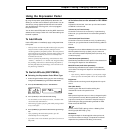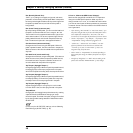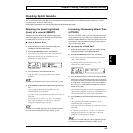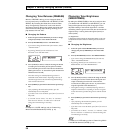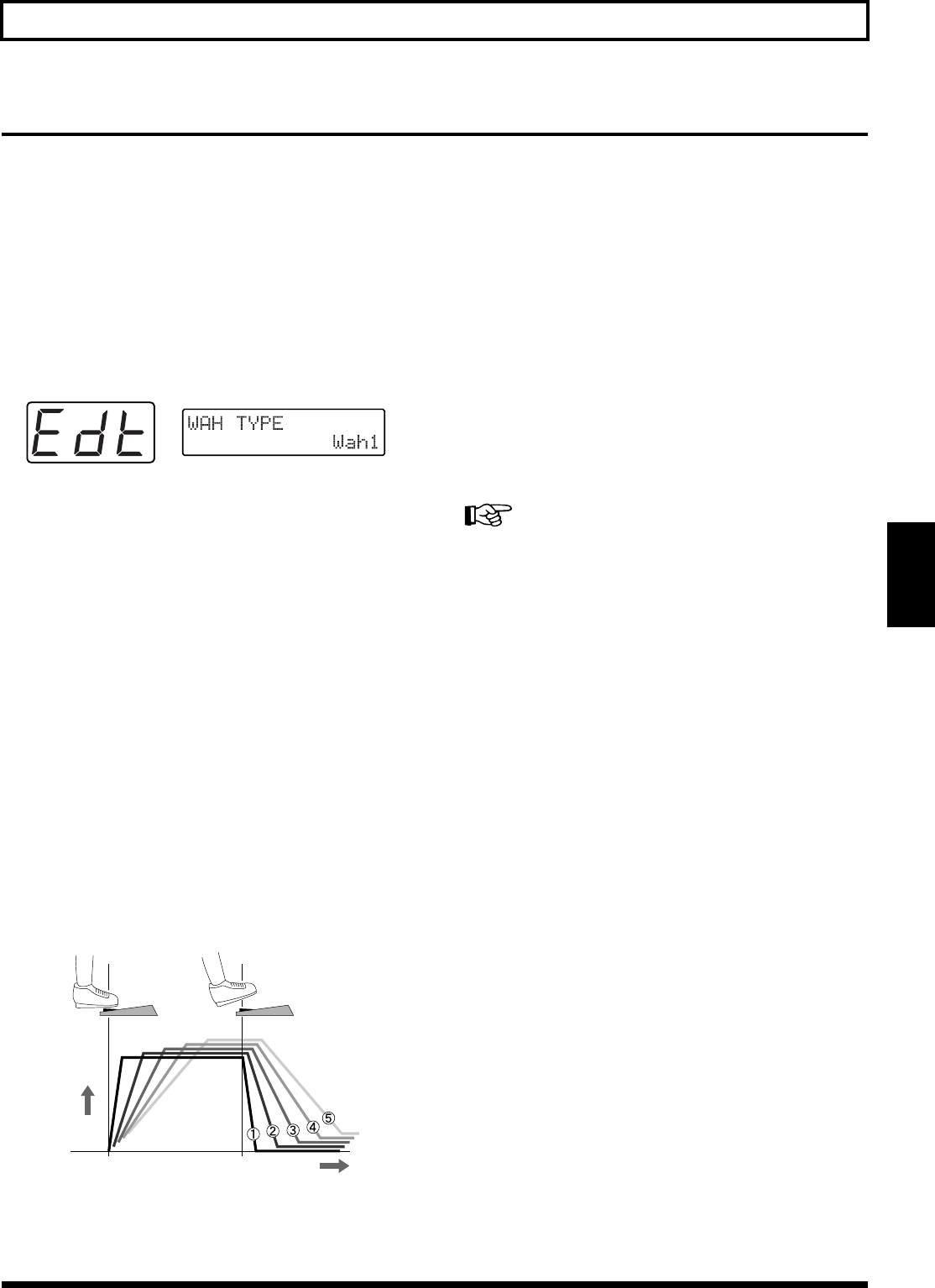
43
Chapter 5 Setting/Changing Sounds (Patches)
Chap.
5
Selecting Wah Types (WAH TYPE)
There are 35 types, in seven groups, of wah effects you can
get by stepping on and releasing pedal 1 in Pedal Effect
mode, with differing ranges of tone change and different
speeds, and along with one type of modulation (vibrato),
there are a total of 36 variations of wah pedal effects.
■ Selecting Wah (or Modulation) Type
1. Select the patch whose effect type you want to change,
and press [COMMON] to go into Patch Edit mode.
2. Press [PARAMETER] to select “WAH TYPE.”
fig.5-18
3. Use [VALUE] to change the setting.
* For a detailed explanation, see the subsequent section, “Wah
Pedal Variations that can be selected in WAH TYPE.”
* When making settings, play the guitar with pressing pedal 1
to try the effect.
4. Press [WRITE] to perform the Patch Write operation (p.
36).
* After performing the Patch Write operation, you will
automatically return to Play mode.
* If you don’t want to save the Patch, press [PLAY] to return to
Play mode.
◆ Wah Pedal Variations that can be selected
in WAH TYPE
The digit (1–5) at the end of the displayed type name
indicates the speed at which the tone will change. When you
step on and release the pedal, the numbers show, with “1”
indicating the fastest tone change, and as these numbers get
larger, the speed decreases.
fig.5-19
Wah1–5:
This adds an effect that resembles a guitar wah pedal to the
synthesizer sound. With this unique effect added to the
sound, stepping on the pedal gives the tone a brighter “wah”
sound, and when the pedal is released, the sound becomes
darker, with an “oww” sound. By repeatedly stepping on
and releasing the pedal, you can get an effect that sounds like
“wah wah wah.”
AutoWah1–5:
This is basically the same effect as the wah pedal (Wah 1–5),
but rather than being applied with the pedal, with this novel
method, the effect is automatically applied each time the
guitar is picked. In this situation, the pedal still works to add
affect, so you can use both of these options together. When
combined with the Play Feel setting “Envelope2” on tones
like Synth Bass, you can get a smooth “touch wah” effect.
For details on setting the “touch wah” effect, refer to
“Following the Guitar Sound Shape (Envelope Follow)” (p.
40).
Brightness1–5:
This controls only the brightness of the sound, without
adding the characteristic sound of the wah itself. In all other
actions, it is absolutely identical to Wah 1 to 5.
NarrowWah1–5:
This compresses the tone difference from stepping on and
releasing the pedal to half the range of the normal wah (Wah
1 to 5). In all other actions, it is absolutely identical to Wah 1
to 5.
R.Wah1–5 (Reverse Wah 1–5):
This reverses the tones from stepping on and releasing the
pedal in normal wah (Wah 1 to 5) (i.e. step → dark sound,
release → bright).
R.Brightness1–5 (Reverse Brightness 1–5):
This reverses the tones from stepping on and releasing the
pedal in the brightness setting (Brightness 1 to 5) (i.e. step →
dark sound, release → bright).
R.NarrowWah1–5 (Reverse Narrow Wah 1–5):
This reverses the tones from stepping on and releasing the
pedal in Narrow (NarrowWah 1 to 5) (i.e. step → dark sound,
release → bright).
Modulation:
When you select this setting, as you step on the pedal, then
rather than a wah-type effect, a deep vibrato (wavering
pitch) effect is added. Differing from the mood created by
playing finger vibrato on the guitar, it gives a mechanical,
synthesizer-sounding vibrato.
The speed and depth of the vibrato you get with this function
is predetermined for each tone.
Examples of Wah1 to Wah5, Brightness1 to Brightness5, etc.
(Changes over time)
Tone
Brightness
Press Release
Time



